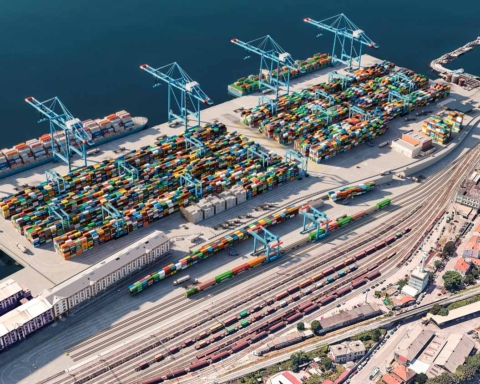“Italy suffers from an infrastructural but also a significant technological handicap. Alessandro Pitto is right when he criticizes the slowdowns linked to the creation of the National Logistics Platform. The Port Community System (PCS) topic is central to the future of our country but perhaps we have not understood it yet.”
This is how Giampaolo Botta, General Manager of the Italian freight forwarders’ assocation Spediporto, begins his reflection.
After dwelling on an issue as topical as the Coronavirus, Mr. Botta takes his cue from the speech recently given by the president of his association during the ‘Ligurian Ports Today and Tomorrow between Past and Future Infrastructures’ workshop organized by Ship2Shore.
In his statements, faithfully reported by Shipping Italy, Mr.Pitto had asked for an acceleration in the development of digital infrastructures, which are still at stake: “Alessandro’s is not a criticism for its own sake but a stimulus to make up lost ground. Gentlemen, this is the last call, no more trains will arrive: the oligopolisation and concentration processes which Nereo Marcucci highlights as threats to social sustainability can only be managed to the extent that ports succeed in becoming active and proactive interlocutors.”
Spediporto’s General Manager thinks about the interview given on Port News by the former president of Confetra: “I share his concerns: the magnitude that certain organizations can express, especially financially, is immeasurably greater than any freight forwarder and logistics operator can compete with.”
At the top of the list are e-commerce operators, such as Alibaba and Amazon: “These giants have huge amounts of cash available, sometimes over $50-60 billion. Their cash-flow is so impressive that it can make more than one country worry about it.”
Moreover, while the Chinese company remains a b2b operator, the U.S. e-commerce company is b2C: “This means that it is able to bypass sales and logistics intermediaries, but also retail intermediaries, because it can reach the consumer directly. This is something revolutionary compared to traditional commercial dynamics.”
The customerization of services offers many opportunities but also generates many risks: “It is clear, the firepower of these multinationals is enormous. Today Amazon can impose its business model on all links in the supply chain. What makes a marketplace company powerful is its ability to manage intangible data, being able to define consumer identikits through analytics and taste-profiling.”
And this is where we need to intervene: “It is not true that a country cannot do anything: our operators, for example, manage a huge amount of information that should be systematized.”
The Port Community Systems devised by the various Port Network Authorities alone are not enough. For Mr. Botta a common vision is needed i.e. that National Logistic Platform that today is struggling to take off: “If our ports are not able to present themselves with a common IT solution that allows operators to interact, if we don’t know how to counter-propose an advanced digital platform, like the one they have in Germany, for example, we will never be able to hope to contain the expansion of these Leviathans.”
Then there is another issue of fundamental importance that, according to Spediporto‘s General Manager, Italy and Europe are seriously underestimating i.e. the renewal of the Consortia Block Exemption Regulation: ” The problem is so underestimated it’s scary. The moment shipowner alliances are allowed to operate without respecting the rules of fair competition they are given the possibility to enter the market vertically and impose their decisions.”
Mr. Botta gives the example of a call for tenders in which a freight forwarder and a shipowner take part: “What chance will that freight forwarder have of winning the tender? None. Because the services that the he/she will be able to offer will certainly have a higher cost than those provided by the shipping company, which will be able to impose its own sea freight rates and set the tariff for selling the handling services in the terminals it owns.”
The situation is discouraging: “We are demolishing the rules of fair competition and we are doing it for free, i.e. without receiving any economic benefit in return. As usual, the only ones who are earning money are the big shipping groups.”
Translation by Giles Foster




